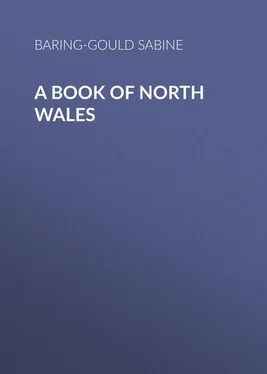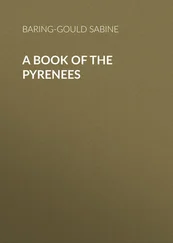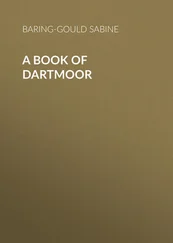Sabine Baring-Gould - A Book of North Wales
Здесь есть возможность читать онлайн «Sabine Baring-Gould - A Book of North Wales» — ознакомительный отрывок электронной книги совершенно бесплатно, а после прочтения отрывка купить полную версию. В некоторых случаях можно слушать аудио, скачать через торрент в формате fb2 и присутствует краткое содержание. Жанр: foreign_antique, foreign_prose, на английском языке. Описание произведения, (предисловие) а так же отзывы посетителей доступны на портале библиотеки ЛибКат.
- Название:A Book of North Wales
- Автор:
- Жанр:
- Год:неизвестен
- ISBN:нет данных
- Рейтинг книги:4 / 5. Голосов: 1
-
Избранное:Добавить в избранное
- Отзывы:
-
Ваша оценка:
- 80
- 1
- 2
- 3
- 4
- 5
A Book of North Wales: краткое содержание, описание и аннотация
Предлагаем к чтению аннотацию, описание, краткое содержание или предисловие (зависит от того, что написал сам автор книги «A Book of North Wales»). Если вы не нашли необходимую информацию о книге — напишите в комментариях, мы постараемся отыскать её.
A Book of North Wales — читать онлайн ознакомительный отрывок
Ниже представлен текст книги, разбитый по страницам. Система сохранения места последней прочитанной страницы, позволяет с удобством читать онлайн бесплатно книгу «A Book of North Wales», без необходимости каждый раз заново искать на чём Вы остановились. Поставьте закладку, и сможете в любой момент перейти на страницу, на которой закончили чтение.
Интервал:
Закладка:
Then he opened his eyes and saw that the sky above was blue as a corn-flower, and he remarked, “It is strange. There has been a shower, and the sun is shining. But where is the rainbow?”
Then Brian said, “Uncle, on the head of Edwin.” Cadwallon looked in his nephew’s face and saw that his eye-lashes were heavy with tears, and he asked the reason.
Thereupon Brian told him all that was in his heart, and Cadwallon rose up and vowed that he would make a desperate effort to recover the land for the British people.
So he made war on Edwin, but met with defeat after defeat, and was finally obliged to escape into Ireland.
There he resolved on seeking the assistance of the Armoricans, so he took ship and sailed for Brittany, but encountered a storm and was wrecked on an island, probably Ouessant, and all on board were lost save only Cadwallon and Brian.
Through distress at the death of his followers, and dearth of food, the king fell into a fit of profound dejection.
Brian was troubled for his uncle, whose heart seemed to be broken. He went about the island seeking for food, but could find naught. The sea-fowl had been disturbed by the gale, and the season was not that for eggs. He endeavoured to collect shell-fish, but the waters still boiled and tumbled on the rocks, and he could obtain none. Then he cut a slice from his own thigh, lighted a fire, roasted the flesh, and brought it to the king, and said that it was venison. Cadwallon, believing this, ate, and his spirit revived within him, and he determined on making an effort to reach the mainland. The wind fell, and he and Brian were able to get their battered ship afloat, and in it they were wafted over to the coast of Brittany. They went before King Solomon, who received them kindly and promised his aid.
So it was resolved that Cadwallon should return to Wales with a thousand men of Armorica, and that Brian should make his way in disguise to the court of Edwin and spy out how matters stood there.
Brian landed at Southampton, and assuming the rags of a beggar, but armed with a spiked staff, made his way to York, where was King Edwin. Brian, in a mendicant’s garb, went to the palace and stood outside among the beggars who waited daily for alms. As he thus stood his sister came forth. She had been taken captive, and had been placed in the household of the queen. She bore a pitcher, and was on her way to the well to fetch water when Brian addressed her in a whining tone. Nevertheless, she at once recognised him, and they carried on a conversation together with caution, lest he should be discovered. What he particularly desired was that a certain counsellor of Edwin should be pointed out to him by whose advice the king was principally governed, and whom the Britons regarded as a specially dangerous adversary.
Brian’s sister did so as the man issued from the door with alms for the beggars. Thereupon Brian pressed through the crowd, and, raising his staff, struck him in the breast and transfixed him there. Then he stepped back and disappeared among the beggars.
Brian now fled to Exeter, where he roused the Western Britons, and they held the city.
Meanwhile Cadwallon had arrived, and through Brian entered into a league with Penda, king of the Mercians, against Edwin. Both forces marched into Northumbria, and a battle was fought at a place called Heathfield, and Edwin was slain and his Northern Angles routed.
Then, for a while, Cadwallon reigned over all the British peoples in Wales, Strathclyde, and Devon and Cornwall.
He was succeeded by his son Cadwaladr, whose mother was a sister of Penda the Mercian. He was a good and peace-loving prince, not made of the same stuff as his father, and although he gained some victories his reign was marked by loss of ground on all sides.
He wore the crown for twelve years. In 664 a terrible plague broke out which spread desolation over Britain and Ireland, and in the latter swept away two-thirds of the inhabitants. Cadwaladr was one of the victims, and was buried in the church that bears his name by Llyn Coron. The church has an east window to the chancel of a flamboyant character, with some old stained glass in it representing the Crucifixion and saints.
The line to Holyhead passes a cluster of lakes of not much beauty – that of Llyn Penllyn has a little island in it – then it crosses a causeway into Holy Isle, and draws up at the terminus of Holyhead, under Pen Caergybi, the highest elevation in Anglesey.
Ruskin says: —
“Just on the other side of the Mersey you have your Snowdon and your Menai Straits, and that mighty granite rock beyond the moors of Anglesey, splendid in its heathery crest, and foot planted in the deep sea, once thought of as sacred – a divine promontory, looking westward, the Holy Head or Headland, still not without awe when its red light glares first through the gloom.”
The cliff scenery here is of the finest quality, and Holyhead well merits a prolonged visit, what with the stimulating air rushing through one’s lungs charged with sparkles, the look-out on the green sea flecked with foam and skimmed by gulls as flakes of froth that have been detached from the waves and become alive, the plunging water on the beach, the purple folds of the hills, and the abrupt cliffs, their feet ever bitten into and worried by the angry waves.
The town is as busy as Beaumaris is inert. It lives on the Irish trade, whereas Beaumaris picks up subsistence during a few short months only from bathers.
The one object of antiquarian interest in the town is the church, planted in the midst of an old caer , or fortress, the walls of which still stand in places 16 feet high, and are over 6 feet thick. The enclosure is quadrangular, and measures 220 feet by 130 feet. To what period the walls belong is hard to determine. They are constructed of unshaped blocks of granite rounded by the action of wind and rain, and are set in mortar made of sea-shells. In places they are arranged herring-bone fashion. The construction is too uncouth to be Roman, and the round towers at the angles are not Irish. It is certainly prior to the English conquest. A Norman builder would have disdained to put forth such work, and it is probably a unique specimen of a caer of late British erection. The two entrances are much more modern. This fortress was held by the Gwyddyl against Caswallon Long-hand. Then the walls were of stones set up without mortar, and probably faced with huge granite slabs. Caswallon forced his way in, and slew the Irish king Serigi with his own hand, where now stands Llan-y-Gwyddel in the churchyard.
The chapel had a chancel, which has been pulled down, and it was converted into a grammar school in 1748, but is now disused. After the expulsion of the Irish the enclosure became a royal caer , and was occasionally occupied by Maelgwn Gwynedd, who made it over to S. Cybi.
The story of the saint is as follows. Cybi was the son of Solomon, king of Cornwall, and Gwen, the aunt of S. David. He was born between the Lynher and Tamar at Callington, and was sent to school when aged seven. Till he was twenty-seven years old Cybi remained in Cornwall, and then he started on his travels on the Continent. There he made the acquaintance of S. Elian the Pilgrim, and a friendship was formed that was to last through life, though little did both suppose at the time that they would be neighbours in their old age. From his travels Cybi returned to Cornwall, where he became involved in a political disturbance.
His father had died whilst he was away, and his uncle Cataw, or Cado, had assumed the rule, but he was succeeded by the turbulent Constantine. The arrival in Cornwall of Cybi gave occasion to an insurrection, and an attempt was made to displace Constantine, and elevate Cybi to the throne. It failed, and Cybi was obliged to fly for his life. He took with him a party of attached disciples and his uncle Cyngar. After a brief stay in Glamorgan he crossed into Ireland, and visited S. Enda in Aran, and remained with him for four years.
Читать дальшеИнтервал:
Закладка:
Похожие книги на «A Book of North Wales»
Представляем Вашему вниманию похожие книги на «A Book of North Wales» списком для выбора. Мы отобрали схожую по названию и смыслу литературу в надежде предоставить читателям больше вариантов отыскать новые, интересные, ещё непрочитанные произведения.
Обсуждение, отзывы о книге «A Book of North Wales» и просто собственные мнения читателей. Оставьте ваши комментарии, напишите, что Вы думаете о произведении, его смысле или главных героях. Укажите что конкретно понравилось, а что нет, и почему Вы так считаете.












